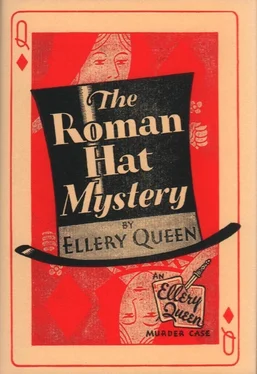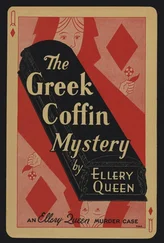The olive-skinned physician hesitated. Then he said stiffly, “I am very sorry, Inspector; you cannot reasonably expect me to be more precise. Under the circumstances...” His voice trailed off, and he backed away.
Queen chuckled as he bent again to his grim task.
The dead man sprawled on the floor was not a pleasant sight. The Inspector gently lifted the clenched hand and stared hard at the contorted face. Then he looked under the seat. There was nothing there. However, a black silk-lined cape hung carelessly over the back of the chair. He emptied all of the pockets of both dress suit and cape, his hands diving in and out of the clothing. He extracted a few letters and papers from the inside breast pocket, delved into the vest pockets and trouser pockets, heaping his discoveries in two piles — one containing papers and letters, the other coins, keys and miscellaneous material. A silver flask initialed “M. F.” he found in one of the hip pockets. He handled the flask gingerly, holding it by the neck, and scanning the gleaming surface as if for fingerprints. Shaking his head, he wrapped the flask with infinite care in a clean handkerchief, and placed it aside.
A ticket stub colored blue and bearing the inscription “LL32 Left,” he secreted in his own vest pocket.
Without pausing to examine any of the other objects individually, he ran his hands over the lining of the vest and coat, and made a rapid pass over the trouser legs. Then, as he fingered the coat-tail pocket, he exclaimed in a low tone, “Well, well, Thomas — here’s a pretty find!” as he extracted a woman’s evening bag, small, compact and glittering with rhinestones.
He turned it over in his hands reflectively, then snapped it open, glanced through it and took out a number of feminine accessories. In a small compartment, nestling beside a lipstick, he found a tiny card-case. After a moment, he replaced all the contents and put the bag in his own pocket.
The Inspector picked up the papers from the floor and swiftly glanced through them. He frowned as he came to the last one — a letterhead.
“Ever hear of Monte Field, Thomas?” he asked, looking up.
Velie tightened his lips. “I’ll say I have. One of the crookedest lawyers in town.”
The Inspector looked grave. “Well, Thomas, this is Mr. Monte Field — what’s left of him.” Velie grunted.
“Where the average police system falls down,” came Ellery’s voice over his father’s shoulder, “is in its ruthless tracking down of gentlemen who dispose of such fungus as Mr. Monte Field.”
The Inspector straightened, dusted his knees carefully, took a pinch of snuff, and said, “Ellery, my boy, you’ll never make a policeman. I didn’t know you knew Field.”
“I wasn’t exactly on terms of intimacy with the gentleman,” said Ellery. “But I remember having met him at the Pantheon Club, and from what I heard at the time I don’t wonder somebody has removed him from our midst.”
“Let’s discuss the demerits of Mr. Field at a more propitious time,” said the Inspector gravely. “I happen to know quite a bit about him, and none of it is pleasant.”
He wheeled and was about to walk away when Ellery, gazing curiously at the dead body and the seat, drawled, “Has anything been removed, Dad — anything at all?”
Inspector Queen turned his head. “And why do you ask that bright question, young man?”
“Because,” returned Ellery, with a grimace, “unless my eyesight fails me, the chap’s tophat is not under the seat, on the floor beside him, or anywhere in the general vicinity.”
“So you noticed that too, did you, Ellery?” said the Inspector grimly. “It’s the first thing I saw when I bent down to examine him — or rather the first thing I didn’t see.” The Inspector seemed to lose his geniality as he spoke. His brow wrinkled and his gray mustache bristled fiercely. He shrugged his shoulders. “And no hat check in his clothes, either... Flint!”
A husky young man in plain clothes hurried forward.
“Flint, suppose you exercise those young muscles of yours by getting down on your hands and knees and hunting for a tophat. It ought to be somewhere around here.”
“Right, Inspector,” said Flint cheerfully, and he began a methodical search of the indicated area.
“Velie,” said Queen, in a businesslike tone, “suppose you find Ritter and Hesse and — no, those two will do — for me, will you?” Velie walked away.
“Hagstrom!” shouted the Inspector to another detective standing by.
“Yes, Chief.”
“Get busy with this stuff” — he pointed to the two small piles of articles he had taken from Field’s pockets and which lay on the floor — “and be sure to put them safely away in my own bags.”
As Hagstrom knelt by the body, Ellery quietly bent over and opened the coat. He immediately jotted a memorandum on the flyleaf of the book in which he had drawn a diagram some time before. He muttered to himself, patting the volume, “And it’s a Stendhause private edition, too!”
Velie returned with Ritter and Hesse at his heels. The Inspector said sharply, “Ritter, go to this man’s apartment. His name is Monte Field, he was an attorney, and he lived at 113 West 75th Street. Stick around until you’re relieved. If any one shows up, nab him.”
Ritter, touching his hat, mumbled, “Yes, Inspector,” and turned away.
“Now Hesse, my lad,” continued the Inspector to the other detective, “hurry down to 51 Chambers Street, this man’s office, and wait there until you hear from me. Get inside if you can, otherwise park outside the door all night.”
“Right, Inspector.” Hesse disappeared.
Queen turned about and chuckled as he saw Ellery, broad shoulders bent over, examining the dead man.
“Don’t trust your father, eh, Ellery?” the Inspector chided. “What are you snooping for?”
Ellery smiled, straightening up. “I’m merely curious, that’s all,” he said. “There are certain things about this unsavory corpse that interest me hugely. For example, have you taken the man’s head measurement?” He held up a piece of string, which he had slipped from a wrapped book in his coat pocket, and offered it for his father’s inspection.
The Inspector took it, scowled and summoned a policeman from the rear of the theatre. He issued a low-voiced order, the string exchanged hands and the policeman departed.
“Inspector.”
Queen looked up. Hagstrom stood by his elbow, eyes gleaming.
“I found this pushed way back under Field’s seat when I picked up the papers. It was against the back wall.”
He held up a dark-green bottle, of the kind used by gingerale manufacturers. A gaudy label read, “Paley’s Extra Dry Ginger Ale.” The bottle was half-empty.
“Well, Hagstrom, you’ve got something up your sleeve. Out with it!” the Inspector said curtly.
“Yes, sir! When I found this bottle under the dead man’s seat, I knew that he had probably used it tonight. There was no matinee today and the cleaning women go over the place every twenty-four hours. It wouldn’t have been there unless this man, or somebody connected with him, had used it and put it there tonight. I thought, ‘Maybe this is a clue,’ so I dug up the refreshment boy who had this section of the theatre and I asked him to sell me a bottle of ginger ale. He said” — Hagstrom smiled — “he said they don’t sell ginger ale in this theatre!”
“You used your head that time, Hagstrom,” said the Inspector approvingly. “Get hold of the boy and bring him here.”
As Hagstrom left, a stout little man in slightly disarranged evening clothes bustled up, a policeman doggedly holding his arm. The Inspector sighed.
“Are you in charge of this affair, sir?” stormed the little man, drawing himself up to five feet two inches of perspiring flesh.
Читать дальше












